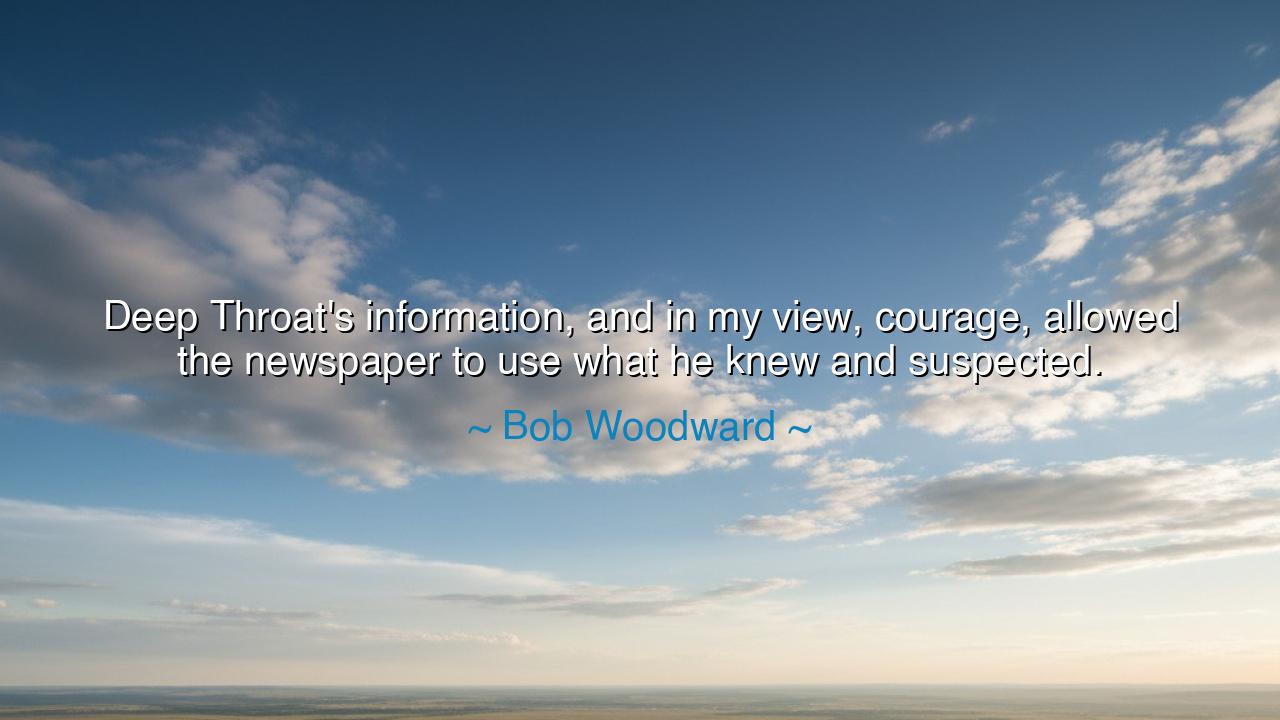
Deep Throat's information, and in my view, courage, allowed the
Deep Throat's information, and in my view, courage, allowed the newspaper to use what he knew and suspected.






The journalist Bob Woodward, one of the two men whose pen helped unravel the greatest political scandal in American history, once said: “Deep Throat's information, and in my view, courage, allowed the newspaper to use what he knew and suspected.” These words, though grounded in the events of the Watergate scandal, speak to something far greater than politics—they speak to the eternal struggle between truth and power, between silence and courage. In them lies a timeless lesson: that even in an age of deception, one voice of conscience, if brave enough, can awaken a nation and change the course of history.
The origin of this quote rests in the shadowed corridors of the 1970s, when the United States faced a test not of armies, but of integrity. The Watergate affair—a web of corruption and secrecy reaching into the highest office of the land—might have remained forever hidden, were it not for the mysterious informant known only as “Deep Throat.” From the darkness of underground parking garages and whispered phone calls, he guided Woodward and his colleague Carl Bernstein toward the truth. But as Woodward reminds us, it was not merely the information that mattered—it was the courage to give it. For truth, without the bravery to speak it, remains buried in silence.
In Woodward’s reflection, we glimpse the sacred partnership between knowledge and courage. Knowledge alone is fragile—it can be hidden, ignored, or dismissed. But when courage joins hands with knowledge, truth becomes unstoppable. Deep Throat, later revealed as Mark Felt, a senior FBI official, risked his career, his reputation, and perhaps his safety, to reveal what his conscience could not tolerate. He became a symbol of moral defiance—the reminder that even within the heart of powerful systems, there can dwell a soul unwilling to betray justice. His courage gave life to the words that brought down a presidency and restored faith, however bruised, in the strength of a free press.
The ancients, too, knew this sacred bond between truth and bravery. Socrates, condemned for questioning the falsehoods of his age, chose to drink the hemlock rather than silence his voice. His courage inspired generations to seek truth even at the cost of comfort or life. Galileo, under threat of the Inquisition, whispered, “And yet it moves,” refusing to deny the truth of the universe. So too did Mark Felt, in his own quiet way, affirm the principle that no man, however powerful, stands above truth. Woodward’s words honor this lineage of courage—that rare virtue that transforms knowledge from a whisper into a thunderclap.
And yet, as Woodward subtly reminds us, courage rarely appears in the light. It is often born in secrecy, in fear, in solitude. Deep Throat was not celebrated at the time; he was unknown, unseen, even doubted. But true courage seeks no applause—it acts because it must. It serves truth, not recognition. The heroism of Felt was not the loud defiance of rebellion, but the quiet endurance of conscience. It was the strength to do what was right, even when no one was watching. That, Woodward suggests, is the deepest kind of bravery—the courage that moves unseen, yet shapes the destiny of nations.
Through this reflection, Woodward gives voice not only to gratitude but to a universal law: the power of courage joined with truth can shake empires. The journalist’s pen, guided by information and protected by integrity, can become a weapon stronger than any sword. In honoring Deep Throat, Woodward honors every man and woman who dares to expose corruption, who refuses to bow before the false gods of comfort or fear. It is a call across generations—a reminder that truth always requires guardians, and courage always demands sacrifice.
So, my children of conscience, take heed of this story, for it is not confined to the pages of history. The battle between silence and truth is eternal, and in every age, the world awaits its new truth-tellers. Be as Deep Throat was: steady, principled, unyielding. When you see wrongdoing, do not hide behind comfort or conformity. Speak when others are silent. Act when others tremble. Remember that courage, even in one soul, can kindle justice in a thousand hearts.
For as Bob Woodward teaches us, the truth alone cannot save the world—but the courage to reveal it can. When knowledge is wedded to bravery, the darkness trembles and falls away. And though time may forget the names of the fearless, it never forgets their deeds. Let this, then, be the creed of all who walk in the light: seek the truth, serve it boldly, and let your courage become the voice through which justice is heard.






AAdministratorAdministrator
Welcome, honored guests. Please leave a comment, we will respond soon